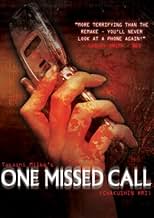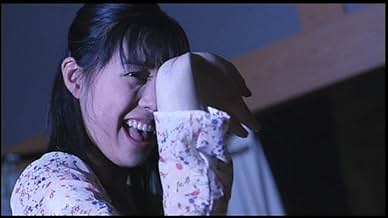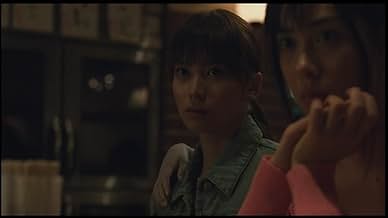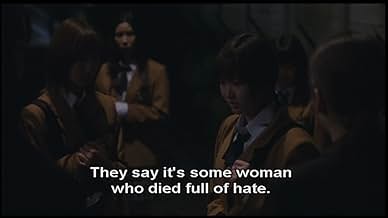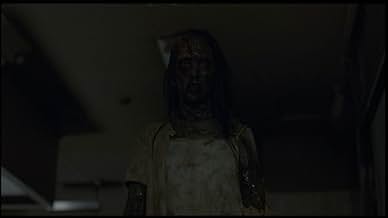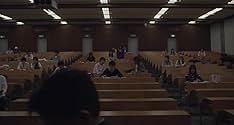AVALIAÇÃO DA IMDb
6,2/10
20 mil
SUA AVALIAÇÃO
Adicionar um enredo no seu idiomaYumi tries to assuage the fears of a friend, Yoko, who has received a disturbing voice mail from herself. In the message, Yoko screams while chatting with Yumi. Three days later, the exact c... Ler tudoYumi tries to assuage the fears of a friend, Yoko, who has received a disturbing voice mail from herself. In the message, Yoko screams while chatting with Yumi. Three days later, the exact call plays out, and Yoko dies.Yumi tries to assuage the fears of a friend, Yoko, who has received a disturbing voice mail from herself. In the message, Yoko screams while chatting with Yumi. Three days later, the exact call plays out, and Yoko dies.
- Direção
- Roteiristas
- Artistas
- Direção
- Roteiristas
- Elenco e equipe completos
- Produção, bilheteria e muito mais no IMDbPro
Avaliações em destaque
This just might be the most interesting psychological drama that I've seen since Miike's own masterpiece Audition (1999), and one that it seems has sadly been misinterpreted by many critics and viewers as being a work of simple J-Horror by numbers. Though it has elements of this, the characteristics of J-Horror, which are very much rooted in standard social and spiritual taboos that many Japanese people take incredibly seriously, are used as window dressing here, intended to distract the audience from the more important and subtle ideas at work behind the surface of the narrative.
It certainly isn't a pastiche or a spoof as some viewers have indicated, though you could argue that it works on a certain satirical level, with the odd hint of benign humour that we've come to expect from Miike woven throughout. However, judging from much of the stylistic tone of the film, with its deeper allusions to child abuse and the murky and alienated tone that the director attaches to it, I honestly can't imagine that this is meant to be laughed at. Those who claim that the film is a comedy or a spoof are more likely to be Miike fans that are unfamiliar with the broader aspects of his work and the way in which he puts his films together; instead judging his films simply on the shock-value and tongue-in-cheek triviality of projects like Ichi the Killer (2002) and Dead or Alive (1999). Yes, he does accept any film that is offered to him, and more often than not chooses work that he feels he can do something interesting with; experimenting with the form and content and occasionally adding his own touches that are often subversive and somewhat attention seeking, but he always has in mind an approach that best suits the material.
He doesn't condescend to his work; there's no cynicism here. As ever, Miike is fulfilling the wishes of his producer whilst simultaneously bringing something else to the film that may have been missed by a lesser filmmaker, more interested in the superficial quality of the story. In this case, a sly comment on the media and how it manipulates tragedy for profit; turning horror and pain into spectacle. It also continues the theme of lost youth; something quite prevalent in Japanese cinema, with films like Battle Royale (2000), Visitor Q (2001), Pulse (2001) and All About Lily Chou-Chou (2002) documenting the recent struggles in both social environments and education, with the idea of a generation of Japanese youth overwhelmed by expectations of family and society and cast adrift in such a way as to leave them ultimately more venerable to a greater evil (be it drugs, gang violence, suicide or crime). It's all done metaphorically of course - with the J-horror elements used to mask these ideas - though certainly, in many of the scenes, we see characters, kids even, isolated and with no one to turn to.
Think about the presentation of both the film and the narrative; the absence of responsible adults creating a ghost world that these kids drift in and out of, turning only to each other for solace. The creation of a nocturnal world where school children hang out on railway bridges in the early hours of the morning, watching scenes of abject horror in a way that suggests tragic familiarity. The way that the background characters - the everyday people on the street - huddle under umbrellas watching a televised exorcism in the centre of Shinjuku completely cut off and detached from everything that is happening, becoming an almost representation of the audience even; eating up the pain and suffering as dismissible entertainment and completely missing the personal horror and exploitation of the abuse itself. Likewise, look at the scenes shot during the day. The streets are mostly empty, save for the presence of the adult media, the police (who have a complicated role within the film) and the students who are at the centre of the whole thing.
Those claiming that this is a comedy seem uneducated when it comes to Miike and his work; looking for the vapid cartoon character and his torrents of gore and depraved sex, and not the finely nuanced filmmaker who gave us excellent, multi-layered works like Shinjuku Triad Society (1995), Rainy Dog (1997), The Bird People in China (1998), Audition (1999), Dead or Alive: Birds (2000) and Gozu (2003). As a horror film, this is effective. The scenes in the abandoned hospital, although clichéd, work incredibly well at ramping the tension. However, there's more to the film once we dig beneath the surface. The final act of the film takes place on at least three different levels; taking in the real, the imagined and the abstracted memory of both. The way Miike brings the various elements together - using stylised production design and skewed perspectives - creates a hall of mirrors like sense of abstraction familiar from the final act of Audition. Think about it. Is Gozu simply an absurd spoof on the latent homosexuality of the Yakuza sub-genre, or is there a more interest sub-textual argument about identity and gender being woven within? One Missed Call works on a similar level.
Those who make the effort to watch Miike's work will know that there is always much more to his films than it initially seems, though you really have to work at it. To suggest that this is a spoof because you fail to appreciate the subtle, sub-textual storytelling and ask simply for mere cartoon-like abstraction is a discredit to a great filmmaker and those of us familiar with Miike's work beyond that of Ichi the Killer. With One Missed Call, Miike gives us a multi-layered film; shocking and satirical in equal measures and tied to a truly tragic depiction of loss, abuse and alienated youth.
It certainly isn't a pastiche or a spoof as some viewers have indicated, though you could argue that it works on a certain satirical level, with the odd hint of benign humour that we've come to expect from Miike woven throughout. However, judging from much of the stylistic tone of the film, with its deeper allusions to child abuse and the murky and alienated tone that the director attaches to it, I honestly can't imagine that this is meant to be laughed at. Those who claim that the film is a comedy or a spoof are more likely to be Miike fans that are unfamiliar with the broader aspects of his work and the way in which he puts his films together; instead judging his films simply on the shock-value and tongue-in-cheek triviality of projects like Ichi the Killer (2002) and Dead or Alive (1999). Yes, he does accept any film that is offered to him, and more often than not chooses work that he feels he can do something interesting with; experimenting with the form and content and occasionally adding his own touches that are often subversive and somewhat attention seeking, but he always has in mind an approach that best suits the material.
He doesn't condescend to his work; there's no cynicism here. As ever, Miike is fulfilling the wishes of his producer whilst simultaneously bringing something else to the film that may have been missed by a lesser filmmaker, more interested in the superficial quality of the story. In this case, a sly comment on the media and how it manipulates tragedy for profit; turning horror and pain into spectacle. It also continues the theme of lost youth; something quite prevalent in Japanese cinema, with films like Battle Royale (2000), Visitor Q (2001), Pulse (2001) and All About Lily Chou-Chou (2002) documenting the recent struggles in both social environments and education, with the idea of a generation of Japanese youth overwhelmed by expectations of family and society and cast adrift in such a way as to leave them ultimately more venerable to a greater evil (be it drugs, gang violence, suicide or crime). It's all done metaphorically of course - with the J-horror elements used to mask these ideas - though certainly, in many of the scenes, we see characters, kids even, isolated and with no one to turn to.
Think about the presentation of both the film and the narrative; the absence of responsible adults creating a ghost world that these kids drift in and out of, turning only to each other for solace. The creation of a nocturnal world where school children hang out on railway bridges in the early hours of the morning, watching scenes of abject horror in a way that suggests tragic familiarity. The way that the background characters - the everyday people on the street - huddle under umbrellas watching a televised exorcism in the centre of Shinjuku completely cut off and detached from everything that is happening, becoming an almost representation of the audience even; eating up the pain and suffering as dismissible entertainment and completely missing the personal horror and exploitation of the abuse itself. Likewise, look at the scenes shot during the day. The streets are mostly empty, save for the presence of the adult media, the police (who have a complicated role within the film) and the students who are at the centre of the whole thing.
Those claiming that this is a comedy seem uneducated when it comes to Miike and his work; looking for the vapid cartoon character and his torrents of gore and depraved sex, and not the finely nuanced filmmaker who gave us excellent, multi-layered works like Shinjuku Triad Society (1995), Rainy Dog (1997), The Bird People in China (1998), Audition (1999), Dead or Alive: Birds (2000) and Gozu (2003). As a horror film, this is effective. The scenes in the abandoned hospital, although clichéd, work incredibly well at ramping the tension. However, there's more to the film once we dig beneath the surface. The final act of the film takes place on at least three different levels; taking in the real, the imagined and the abstracted memory of both. The way Miike brings the various elements together - using stylised production design and skewed perspectives - creates a hall of mirrors like sense of abstraction familiar from the final act of Audition. Think about it. Is Gozu simply an absurd spoof on the latent homosexuality of the Yakuza sub-genre, or is there a more interest sub-textual argument about identity and gender being woven within? One Missed Call works on a similar level.
Those who make the effort to watch Miike's work will know that there is always much more to his films than it initially seems, though you really have to work at it. To suggest that this is a spoof because you fail to appreciate the subtle, sub-textual storytelling and ask simply for mere cartoon-like abstraction is a discredit to a great filmmaker and those of us familiar with Miike's work beyond that of Ichi the Killer. With One Missed Call, Miike gives us a multi-layered film; shocking and satirical in equal measures and tied to a truly tragic depiction of loss, abuse and alienated youth.
Most Japanese movies are considered as low-budget compared to their Hollywood counterparts. This is because their production costs are so high. However this factor does not deter Japanese creative production teams to come up with movie gems, in different genres.
In the realm of Japanese horrors for example, a studio working with a limited budget has to resort to Jaws-style direction, in which you hardly see or visualise the ghosts/monsters.
And it is through the movie's simplicity, or by not showing/explaining too much, that J-horrors have turned up the notch on the haunting and horror levels through movies such as Ring and Dark Water. Of course there are the still plenty of gorefest movies such as Suicide Circles and Ichi the Killer, the latter being a courtesy of that notorious but prolific J-director, Takashi Miike.
So it is remarkable and truly rewarding to see how Miike toned down his tastes for the twisted and perverted in One Missed Call. Furthermore he implemented his flair of storytelling through symbolisms and graphic metaphors quite nicely. Any shock/gore elements were used in such a way that they serve the movie, instead of downgrading it to a cheesy flick.
In conclusion, One Missed Call satisfies on many levels, providing you keep an open mind and just enjoy the ride. Another plus of the movie is the appearances of several gorgeous J-idols, such as Kazue Fukishii and Kou Shibasaki. Nifty!
In the realm of Japanese horrors for example, a studio working with a limited budget has to resort to Jaws-style direction, in which you hardly see or visualise the ghosts/monsters.
And it is through the movie's simplicity, or by not showing/explaining too much, that J-horrors have turned up the notch on the haunting and horror levels through movies such as Ring and Dark Water. Of course there are the still plenty of gorefest movies such as Suicide Circles and Ichi the Killer, the latter being a courtesy of that notorious but prolific J-director, Takashi Miike.
So it is remarkable and truly rewarding to see how Miike toned down his tastes for the twisted and perverted in One Missed Call. Furthermore he implemented his flair of storytelling through symbolisms and graphic metaphors quite nicely. Any shock/gore elements were used in such a way that they serve the movie, instead of downgrading it to a cheesy flick.
In conclusion, One Missed Call satisfies on many levels, providing you keep an open mind and just enjoy the ride. Another plus of the movie is the appearances of several gorgeous J-idols, such as Kazue Fukishii and Kou Shibasaki. Nifty!
This movie has a more than interesting and good premise and it also has a real promising beginning but as the movie and its story start to progress more the movie actually gets worse and starts to drag and become overlong.
Japanese horror movies are well known and appreciated over the world now days, due to the global success of several genre pieces, with of course "Ringu" as the best example of this. And even though these movies are always well made and good looking ones, there are often more or less the same. Aside from its premises, they are often hardly original in their execution, with the exception of an occasional memorable and effective sequences. And yes, this movie is also pretty much more of the same. It's welcome for the fans of it but it's just offering too little originality, which makes this a movie you'll easily forget.
This is a pretty mainstream movie for normal Takashi Miike standards. Guess he needs to make these type of movies, every once in a while, before he can continue and finance his other movie projects, that are less mainstream and just plain odd and weird with their style and approach. But it are still the movies he is known for and also most appreciated more by people all over the world. I'm not a fan of just all of his movies but often his weirdness, extreme graphic violence and humorous approach of it all can still appeal to me and make his movies something unique and enjoyable for me. But this movie really doesn't has any of that. It's made in the same style as any other popular Japanese horror movie, which means that this movie will probably also disappoint most Takashi Miike lovers.
Thing with this movie is that it has an alright story and main premise in its beginning but the more it all progresses the harder it gets to understand and the less interest you'll keep in this movie. It's the reason why the movie feels like it's dragging at points and feels also certainly overlong. This is a movie that should at least had been 20 minutes shorter really.
This also certainly goes at the expense of the horror and mystery of the movie. Horror-wise this movie is certainly disappointing in what it is offering. Again, because it's being nothing too original but also because the movie it's story-telling doesn't really get you involved with things and therefore a lot of the mystery and tension dies off pretty quick already. It also doesn't help that the movie becomes more and more confusing toward its ending.
But overall, this movie still does a lot of things well. It's certainly not any worse than the average Japanese horror entry and despite all of its problems, I still consider this a watchable movie.
6/10
http://bobafett1138.blogspot.com/
Japanese horror movies are well known and appreciated over the world now days, due to the global success of several genre pieces, with of course "Ringu" as the best example of this. And even though these movies are always well made and good looking ones, there are often more or less the same. Aside from its premises, they are often hardly original in their execution, with the exception of an occasional memorable and effective sequences. And yes, this movie is also pretty much more of the same. It's welcome for the fans of it but it's just offering too little originality, which makes this a movie you'll easily forget.
This is a pretty mainstream movie for normal Takashi Miike standards. Guess he needs to make these type of movies, every once in a while, before he can continue and finance his other movie projects, that are less mainstream and just plain odd and weird with their style and approach. But it are still the movies he is known for and also most appreciated more by people all over the world. I'm not a fan of just all of his movies but often his weirdness, extreme graphic violence and humorous approach of it all can still appeal to me and make his movies something unique and enjoyable for me. But this movie really doesn't has any of that. It's made in the same style as any other popular Japanese horror movie, which means that this movie will probably also disappoint most Takashi Miike lovers.
Thing with this movie is that it has an alright story and main premise in its beginning but the more it all progresses the harder it gets to understand and the less interest you'll keep in this movie. It's the reason why the movie feels like it's dragging at points and feels also certainly overlong. This is a movie that should at least had been 20 minutes shorter really.
This also certainly goes at the expense of the horror and mystery of the movie. Horror-wise this movie is certainly disappointing in what it is offering. Again, because it's being nothing too original but also because the movie it's story-telling doesn't really get you involved with things and therefore a lot of the mystery and tension dies off pretty quick already. It also doesn't help that the movie becomes more and more confusing toward its ending.
But overall, this movie still does a lot of things well. It's certainly not any worse than the average Japanese horror entry and despite all of its problems, I still consider this a watchable movie.
6/10
http://bobafett1138.blogspot.com/
A good Japanese-surprise.
Was looking for something different to watch in Americanized Netherlands, and found this movie. If you have never seen any of the recent Japanese fear movies, then this one is a good compilation of the others (Ring, Dark Water, Kairo...) : strange camera angles, blurry pictures, good sound effects and music and a nice-and-somewhat logical script. I was worried about the Miike's touch, but in fact it was a surprising plus for this kind of movie, where ghosts and gore combine well. Takashi shows he knows a lot about filming methods, and also gives us an overview of the Japanese craziness about mobile phones : I can assure you that you will never look again the same way at your phone after seeing such a movie.
For the ones who have seen other Japanese horror movies, I would advise it as well, as you enjoy seeing again the same old tricks in a different context...and it works again !
So if you have the chance to have this one in a nearby theater...just try it !!
Was looking for something different to watch in Americanized Netherlands, and found this movie. If you have never seen any of the recent Japanese fear movies, then this one is a good compilation of the others (Ring, Dark Water, Kairo...) : strange camera angles, blurry pictures, good sound effects and music and a nice-and-somewhat logical script. I was worried about the Miike's touch, but in fact it was a surprising plus for this kind of movie, where ghosts and gore combine well. Takashi shows he knows a lot about filming methods, and also gives us an overview of the Japanese craziness about mobile phones : I can assure you that you will never look again the same way at your phone after seeing such a movie.
For the ones who have seen other Japanese horror movies, I would advise it as well, as you enjoy seeing again the same old tricks in a different context...and it works again !
So if you have the chance to have this one in a nearby theater...just try it !!
After "Audition" and "Ichi The Killer", I had great expectations for this movie. What it delivers is essentially the "greatest hits" of Asian horror. There's more than a passing resemblance to "The Ring", with bits of "Ju-On" and other films thrown in for good measure.
The film revolves around mobile 'phones. A girl has a message left on her mobile 'phone answering service - only it's been left by herself and in the future! To make matters worse, it ends with a blood curdling scream! Well, it soon turns out that the message is the girl's final words on this mortal coil.
The girl is not alone. It's only a matter of time before the body count starts rising and a race against time begins to solve the mystery of the bizarre calls.
Despite being more than a shade Ringu-clone-esquire, I heartily enjoyed this film. It has some great set-pieces (including a memorable death), some spooky moments, a few "jump" sequences, etc. What the film didn't deliver, though, was any real fear. It was a case of "seen it all before" (a criticism that some levelled at "Ju-On").
The plot unravels in a logical manner and there's a decent pay off. It may not be a future classic, but this is a very well made example of Asian horror cinema.
My rating: 8 out of 10 for a stylish addition to Miike's portfolio
The film revolves around mobile 'phones. A girl has a message left on her mobile 'phone answering service - only it's been left by herself and in the future! To make matters worse, it ends with a blood curdling scream! Well, it soon turns out that the message is the girl's final words on this mortal coil.
The girl is not alone. It's only a matter of time before the body count starts rising and a race against time begins to solve the mystery of the bizarre calls.
Despite being more than a shade Ringu-clone-esquire, I heartily enjoyed this film. It has some great set-pieces (including a memorable death), some spooky moments, a few "jump" sequences, etc. What the film didn't deliver, though, was any real fear. It was a case of "seen it all before" (a criticism that some levelled at "Ju-On").
The plot unravels in a logical manner and there's a decent pay off. It may not be a future classic, but this is a very well made example of Asian horror cinema.
My rating: 8 out of 10 for a stylish addition to Miike's portfolio
Você sabia?
- CuriosidadesDuring the opening credit sequence, one of the cell phone ring-tones is the theme song from an earlier Takashi Miike film, Gozu (2003).
- Erros de gravaçãoYumi arrives at the abandoned hospital at 6:45 p.m. on April 24, and it's nighttime. On that date, sunset in Japan ranges from around 6:20 p.m. Japan Standard Time in the east, near Tokyo, to around 6:55 p.m. in the west, near Nagasaki. Depending on what part of Japan she is in, it should be daytime or twilight outside, not full dark.
- Citações
Yoko Okazaki: Oh no, it's raining.
- ConexõesFeatured in Chakushin ari meikingu: Chakushin rireki (2003)
- Trilhas sonorasIkutsuka no Sora
(Few Skies)
Vocal by Kô Shibasaki (as Kou Shibasaki)
Written by Yasushi Akimoto
Composed by Jin Nakamura
Arranged by Chokkaku
Universal J / Chimera Energy
Principais escolhas
Faça login para avaliar e ver a lista de recomendações personalizadas
- How long is One Missed Call?Fornecido pela Alexa
Detalhes
Bilheteria
- Faturamento bruto mundial
- US$ 17.605.379
- Tempo de duração1 hora 52 minutos
- Cor
- Mixagem de som
- Proporção
- 1.85 : 1
Contribua para esta página
Sugerir uma alteração ou adicionar conteúdo ausente


